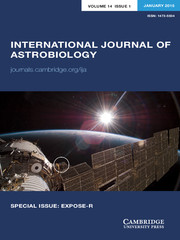Article contents
UV-Vis spectroscopy of stardust
Published online by Cambridge University Press: 19 October 2006
Abstract
NASA's Stardust mission flew through the coma of comet Wild 2 in January 2004, capturing dust grains as it did so. The grains were returned safely to Earth in January 2006, and are in the process of being distributed to investigators. As members of the Spectroscopy Preliminary Examination Team, we are preparing to analyse Stardust grains. Our contribution is to measure the spectrum of the grains between 200 nm (in the near ultraviolet) and 800 nm (near infrared). The purpose of the measurement is to provide an additional technique for characterizing the grains, one that is complementary to other spectroscopic techniques and one that produces results that can be matched directly with spectra acquired remotely (with telescope or spacecraft instrumentation). As part of the preparation for analysis of Stardust materials, we are producing a database of spectra from appropriate minerals, and are honing the technique through analysis of primitive meteorites.
- Type
- Research Article
- Information
- Copyright
- 2006 Cambridge University Press
- 1
- Cited by


